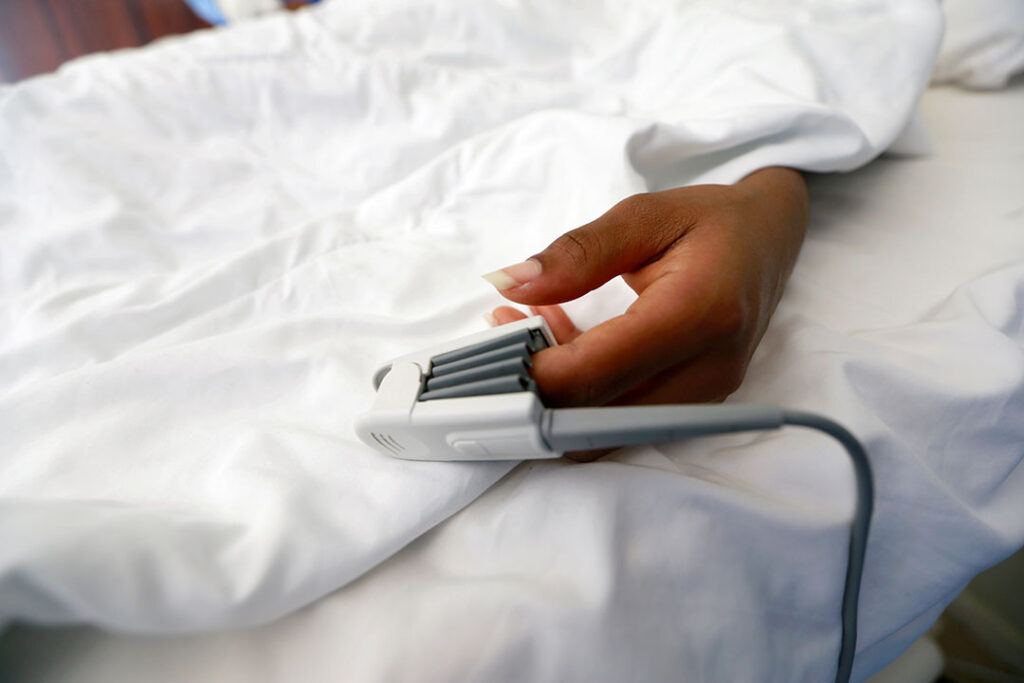ADF STAFF
As COVID-19’s delta variant sweeps across Africa, critically ill patients who end up in the hospital face a high chance of dying as overwhelmed health systems struggle to provide enough oxygen and intensive care beds.
A study of critical care patients in hospitals across the globe found that nearly half of those in Africa died within 30 days compared to the global average of 31.5%. The authors of the study, published in the British medical journal The Lancet, found two likely reasons for Africa’s higher death rates:
“First, the scarcity of critical care resources in African countries might contribute to the high critical care mortality,” they wrote. “Second, there are inadequate critical care beds, with only one in two patients referred to critical care being admitted.”
According to co-author Bruce Biccard of the University of Cape Town, the lack of critical care resources has compromised the continent’s ability to help those with severe infections.
Chief among those scarce critical care resources is oxygen. COVID-19 patients use tremendous amounts of supplemental oxygen through face masks and mechanical ventilators.
The demand of oxygen across the continent is outpacing the supply, even as the number of oxygen concentrators has nearly tripled over the past year.
According to Dr. Matshidiso Moeti, the World Health Organization’s (WHO) Africa regional director, hospital admissions for patients with severe COVID-19 cases are at unprecedented levels in 10 countries. Six countries face a shortage of intensive care beds. Hospitals don’t have enough staffers to meet the demand.
The oxygen shortage has become the deciding factor between who lives and who dies.
“The No. 1 priority for African countries is boosting oxygen production to give critically ill patients a fighting chance,” Moeti said recently.
A WHO review of hospital oxygen systems on the continent found too little oxygen, a lack of cylinders needed to hold the oxygen, broken or poorly maintained oxygen plants and poorly trained staff members at oxygen facilities.
In Sudan, an unreliable power supply means the country’s main oxygen-generating plant is unable to meet hospitals’ needs, leading to deaths.
“My father passed away due to the lack of an intensive care bed with a ventilator,” Khartoum resident Sayda Mahmoud told Reuters through tears.
With less than 2% of Africa’s 1.3 billion people fully vaccinated and fatigue driving many people to shun masks and other precautions, the delta variant has gotten a strong foothold on the continent. Cases are rising rapidly and deaths along with them.
In the first week of August, the Africa Centres for Disease Control and Prevention (Africa CDC) reported 273,000 new COVID-19 cases, a 14% jump from the week before. Since the pandemic began in early 2020, 6.8 million people in Africa have become sick with COVID-19 and 173,000 have died.
Thirty-two of the African Union’s 55 member states are experiencing a third wave of COVID-19 infections. A few, including Algeria, Kenya and Tunisia, are experiencing a fourth wave.
The continentwide case-fatality rate — the percentage of those cases that resulted in a death — sits at 2.5%. However, several countries, including Egypt, Somalia and Sudan, are seeing death rates of about 5%, according to Africa CDC Director Dr. John Nkengasong.
The WHO is helping countries improve their COVID-19 treatments and expand their critical care capacities by dispatching experts to train health care workers. It’s also delivering crucial supplies, including oxygen cylinders and ventilators, and helping to repair oxygen production facilities.
“Deaths have climbed steeply for the past five weeks,” Moeti said. “This is a clear warning sign that hospitals in the most impacted countries are reaching a breaking point.”

